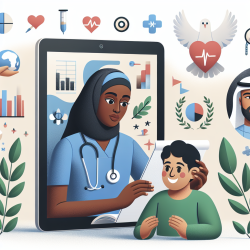Introduction
In regions affected by war and political conflict, healthcare infrastructure often collapses, leaving communities vulnerable. The research article, "The Peacebuilding Potential of Healthcare Training Programs," explores how healthcare training can serve as a bridge for peace. This blog post will delve into the findings of this research and provide insights for practitioners looking to enhance their skills and contribute to peacebuilding efforts.
Key Findings from the Research
The study conducted by Ratner and Katona (2016) in South Sudan highlights the dual benefits of healthcare training: improving medical knowledge and fostering peace. The training program brought together villagers from different tribes, languages, and religions, fostering positive interactions and community bonds. The following features were identified as crucial for successful peacebuilding through healthcare training:
- Community Leader Buy-In: Ensuring respected community leaders support the program to build trust and encourage participation.
- Supportive Environment: Creating an atmosphere of equal status and respect among trainees.
- Hands-On Training: Facilitating positive interactions through practical exercises that challenge stereotypes and build friendships.
Implications for Practitioners
Practitioners can leverage these insights to enhance their training programs and contribute to peacebuilding. Here are some actionable steps:
- Engage Community Leaders: Collaborate with local leaders to gain their support and ensure the program's success.
- Foster Inclusivity: Design training sessions that promote equal participation and respect for all attendees.
- Emphasize Practical Learning: Incorporate hands-on exercises that encourage collaboration and interaction among participants.
Encouraging Further Research
While the study provides valuable insights, it also highlights the need for further research to empirically validate the peacebuilding potential of healthcare training. Practitioners are encouraged to document their experiences and share findings to contribute to this growing field of study.
Conclusion
The integration of peacebuilding features into healthcare training programs can lead to improved medical knowledge and strengthened community relations. Practitioners have the opportunity to play a pivotal role in this process by implementing the strategies outlined in the research. For those interested in delving deeper into the study, please read the original research paper, The peacebuilding potential of healthcare training programs.










